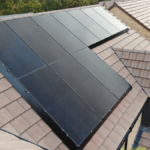


The United Kingdom’s solar energy landscape is undergoing a remarkable transformation, characterized by significant advancements and ambitious plans for capacity expansion and efficiency improvements. Recent UK government initiatives and policy changes point towards a promising future for the domestic solar industry.
Ambitious Targets and Supportive Policies
A key development in this transformation is the Labour government’s bold target to triple solar power generation capacity to 50 gigawatts (GW) by 2030, as reported by Energy Live News. This ambitious goal underscores the government’s commitment to renewable energy and aligns with Solar Energy UK’s advocacy for a comprehensive Solar Roadmap. This roadmap, when implemented, is expected to stimulate investment in the solar sector, create new green jobs, and ultimately lead to lower electricity costs for consumers.
The Solar Roadmap is expected to include details on:
- Financial incentives for solar power installations, such as grants or subsidies.
- Streamlined planning permission processes for solar farms and domestic installations.
- Measures to address grid connection delays.
- Skills development programs to create a qualified workforce for the solar industry.
Residential Installations Driving Growth
The UK’s solar energy sector has already witnessed significant growth, with total solar capacity reaching 15.7 GW in early 2024. This represents a remarkable 6.6% increase from January 2023. Notably, residential installations have been the primary driver of this expansion, highlighting the increasing popularity of solar panels among homeowners. Projections from industry experts suggest that this trend is likely to continue, with estimates exceeding 450,000 new residential solar PV installations annually by 2030.
The rise in residential solar installations can be attributed to several factors, including:
- Increasing awareness of the environmental benefits of solar energy
- Government incentives, such as the Feed-in Tariff scheme, which has been in place since 2010
- Falling costs of solar panels and battery storage systems
- Growing interest in energy independence and reducing household bills
Untapped Potential: Solar Power for Businesses
The forthcoming Solar Roadmap, championed by the government, will place a strong focus on unlocking the vast potential of solar power generation on commercial sites. This includes schools, warehouses, and car parks, which offer significant rooftop space that can be harnessed for clean energy production. By strategically utilizing these untapped resources within urban and suburban environments, the UK can significantly increase its overall solar capacity.
The benefits of installing solar panels on commercial buildings include:
- Lower energy bills for businesses
- Reduced carbon footprint
- Improved corporate social responsibility profile
- Potential for revenue generation by selling surplus electricity back to the National Grid
Aligning with Climate Change Goals: The Role of Solar PV
In line with the recommendations set forth by the Climate Change Committee, Solar Energy UK has outlined a comprehensive plan to achieve a threefold increase in solar PV capacity to 40 GW by 2030. Realizing this ambitious target is anticipated to generate substantial economic benefits. These include the creation of 13,000 new jobs, a £17 billion boost to the UK economy, and a significant reduction in the country’s total carbon emissions, estimated to be around 4.7%. However, achieving this level of growth will necessitate supportive policy changes from the government. These include reforms to business rates, the elimination of VAT on solar energy systems, and continued participation in government-led clean power auctions, which provide financial incentives for renewable energy projects.
The transition to a low-carbon economy will require a significant increase in renewable energy generation capacity. Solar PV is a mature and cost-effective technology that can play a major role in meeting this challenge. By deploying more solar panels, the UK can reduce its reliance on fossil fuels and help to mitigate climate change.
| Policy Measures to Support Solar PV Growth | Benefits |
|---|---|
| Financial incentives (grants, subsidies) | Lower installation costs for homes and businesses |
| Streamlined planning processes | Faster deployment of solar projects |
| Reforms to business rates | Make solar power more affordable for businesses |
| Elimination of VAT on solar energy systems | Further reduce costs and stimulate demand |
| Continued participation in clean power auctions | Provide financial certainty for renewable energy developers |
Building a Sustainable Energy Future: Beyond Energy Demands
The push for solar energy in the UK extends beyond simply meeting the country’s growing energy demands. It is also a critical step towards building a sustainable and resilient energy future. The government has rightly identified grid connection delays as a significant obstacle to clean power generation and industrial electrification. To address this challenge, a key focus area is on enhancing the capacity and efficiency of the electricity network. This will be essential for integrating the increasing amount of solar power into the national grid, ensuring a reliable and continuous supply
Ready to Unleash the Power of the Sun?
Contact NXTGEN Energy today and let’s turn your roof into a sun-powered cash machine! We’ll help you navigate the process and unlock the full potential of solar power for your home or business. Click the ‘Enquire Now’ button to get in touch today!
NXTGEN Energy – Your Trusted Solar Energy Partner
FAQ: Solar Energy in the UK
Latest Solar Panel Posts
- Solar Panels: Pros, Cons, and Whether They’re Worth ItSolar panels can cut your energy bills by up to 70%, and surplus electricity can be sold back to the National Grid through the Smart Export Guarantee (SEG) Scheme. They reduce your carbon footprint, require minimal maintenance, and can last over 30 years, making them a long-term eco-friendly investment. Upfront costs are… Read more: Solar Panels: Pros, Cons, and Whether They’re Worth It
- UK Schools and Hospitals to Receive £180 Million Solar InvestmentSolar Investment: The UK government, through Great British Energy, is investing £180 million to install solar panels on 200 schools and 200 hospitals as part of its net-zero carbon strategy. Benefits: This initiative aims to cut energy costs, reduce carbon emissions, and enhance energy security by reducing reliance on imported fossil fuels. … Read more: UK Schools and Hospitals to Receive £180 Million Solar Investment
- Understanding Solar Panel EfficiencySolar panels convert sunlight to electricity through photovoltaic cells, storing extra energy for later use. There are three main types of solar panels: monocrystalline, polycrystalline, and thin-film. Monocrystalline panels lead in efficiency (20%+), but new technologies are improving performance continuously. Solar panels save money, boost property value & reduce environmental impact,… Read more: Understanding Solar Panel Efficiency
- How SolaSkirt Can Protect Your Solar PanelsPigeon Issues: Pigeons under solar panels damage cables, leave guano, spread disease & create noise. SolaSkirt Fix: Aluminium barrier that blocks pigeons, enhances panel look, and installs without damage. Top Benefits: Durable, weatherproof, maintenance-free, and improves aesthetics & efficiency of panels. Cost-Saving: An affordable pigeon proofing solution that prevents expensive future… Read more: How SolaSkirt Can Protect Your Solar Panels
- Are Brits Turning Their Backs on Solar Panels?High upfront costs: Deter many Brits from installing solar panels despite falling prices & financing options. Myths debunked: Solar panels work in cloudy weather, need minimal maintenance & can last 25–30 years. Financial & Environmental benefits: Solar panels cut electricity bills by up to 70% & lower carbon footprints. Government support… Read more: Are Brits Turning Their Backs on Solar Panels?
- Choosing the Best Solar Panel System InstallerChoose MCS certified installers with Solar PV and Battery Storage Certificates for quality & incentives. Pick local installers familiar with Essex, Kent, and London’s weather and building regulations. Look for full-service solar installers from consultation to maintenance with MCS certification. NXTGEN Energy offers tailored solar panel systems for homeowners in Essex,… Read more: Choosing the Best Solar Panel System Installer
- Solar Panel System Maintenance in the UKRegular Maintenance: Ensures optimal performance, maximizes energy efficiency & prevents costly repairs. Common Issues in the UK: Dirt, debris, bird droppings & ice build-up require regular cleaning & inspections. Best Practices: Clean panels with soft cloth & water, monitor performance & schedule maintenance visits. Seasonal Tips: Spring cleaning, summer heat protection,… Read more: Solar Panel System Maintenance in the UK
- Are solar panels worth it? NXTGEN Energy’s guide to getting startedInstalling solar panels can significantly reduce electricity bills, with prices dropping in recent years. Solar panels are a good investment for those with the space, daytime electricity usage & a south-facing roof. Consider financing options carefully, as borrowing can be expensive; paying outright provides better returns. Solar batteries store energy for… Read more: Are solar panels worth it? NXTGEN Energy’s guide to getting started
- How Amazon is Preparing for the Energy Needs of the FutureAmazon has over 600 renewable energy projects globally, with 230+ in Europe. These efforts support Amazon’s goal of net-zero carbon emissions by 2040. Amazon remains the top global and European corporate renewable energy buyer for the fifth year. Key achievements include 46 new projects in Europe, doubling Japan’s capacity & 53 projects in India. Discover… Read more: How Amazon is Preparing for the Energy Needs of the Future
- How Solar Panels Are InstalledWhat you can expect from a solar panel installation Solar panel installations typically take about a day to complete, depending on the complexity of the system. Solar panel installations require scaffolding, fixing brackets, wiring, inverter & interconnection to the grid. Solar panel installations need to be done by MCS Certified installers, who… Read more: How Solar Panels Are Installed
- How Solar Panels Increase Property ValueSolar panels can boost your home’s value by an average of £2,000 & command a price premium of 0.9% to 2%. Homes with solar panels have better EPC ratings, which can increase property value by up to 14%. Eco-friendly homes are in high demand, making solar-powered homes more attractive to buyers. … Read more: How Solar Panels Increase Property Value
- Did You Know That Solar Costs Have Fallen by 82%?Solar panel costs have dropped by 82% since 2010, making solar energy more accessible for UK homeowners. Factors to consider before switching to solar include initial investment, energy savings, and roof suitability. Government incentives, such as the Smart Export Guarantee (SEG) scheme, can help offset the initial costs. NxtGen Energy offers… Read more: Did You Know That Solar Costs Have Fallen by 82%?


 The UK Solar Energy Landscape
The UK Solar Energy Landscape















